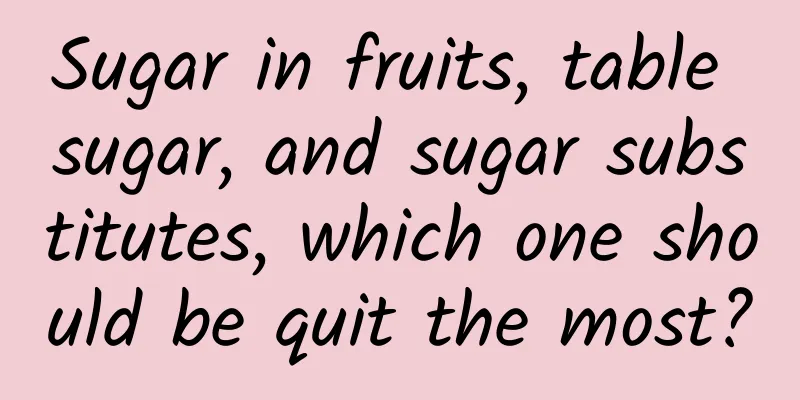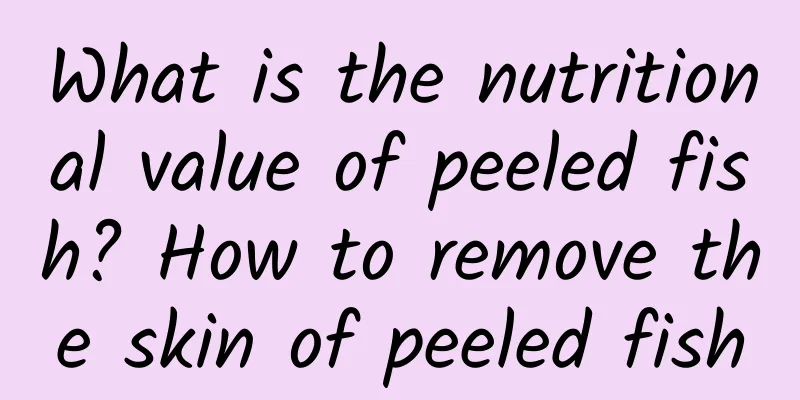Sugar in fruits, table sugar, and sugar substitutes, which one should be quit the most?

|
Author: Cui Yihui, registered dietitian, master of medicine Reviewer: Wang Junbo, Associate Professor and Doctoral Supervisor, Peking University Health Science Center Nowadays, "rich diseases" are prevalent, especially diabetes, which makes people "worry". People who advocate a healthy diet will first "quit sugar" because sugar (or sweets) can only bring temporary happiness, but may cause health problems such as obesity, tooth decay, and diabetes, so they can only "give up" it with pain. ■Which type of sugar should you quit? The answer is table sugar, which is also called "free sugars". According to the World Health Organization (WHO) in the "Guidelines for Sugar Intake for Adults and Children", free sugars include the following three categories. ➣Sucrose (white sugar, soft sugar, rock sugar, brown sugar), glucose and fructose added when making food. ➣Sweet starch hydrolysis products commonly used in the food industry, such as starch syrup, maltose syrup, glucose syrup, corn syrup and fructose syrup. ➣Pure fruit juice and fruit juice concentrate, and sugar present in honey. Free sugars do not include the following 3 categories. ➣Sugars naturally found in whole, fresh fruits and vegetables. ➣Lactose in milk. ➣Starch in grains and potatoes. An adult's daily intake of free sugars should be controlled below 10% of the total energy intake. If it drops below 5%, or the daily intake of sugar is about 25 g, it will be more beneficial to the body. For example, if a woman who does light physical labor needs to consume a total energy of 1500 kcal per day, the energy provided by free sugars is recommended not to exceed 150 kcal (equivalent to 37.5 g of sugar). In fact, it is easier to consume 37.5 g of sugar per day than we think. For example, many pure fruit juices on the market have a sugar content of 16% to 20%. Drinking a glass (about 200 ml) basically exceeds the sugar intake. ■Sugar in Fruit So, are the sugar in fruits the same as the sugar added to processed foods? Is fruit a healthy food? Does “quitting sugar” mean we should stop drinking juice or should we also stop eating fruit? Here are 3 points to answer your questions. ➣Fresh fruits are of course healthy food. Although in terms of sugar composition, fruits naturally contain fructose, glucose, and sucrose, which is a compound of these two sugars, the sugar density in fruits is much lower. Moreover, fruits are not just for energy like carbonated drinks. Fruits are rich in vitamins, minerals, dietary fiber, and phytochemicals (lycopene, anthocyanins, etc.), which make fruits more nutritious. Therefore, fresh fruits are not restricted free sugars. ➣ No matter how pure the fruit juice sold in the market is, it is recommended to drink less (less than 1 cup per day, about 200 ml) or not drink it, which can be regarded as the same treatment as quitting sugary drinks such as cola. If a product claims to be "low in sugar", then it depends on whether it meets the low-sugar standard stated on the nutrition label (sugar content in 100 ml of liquid or solid is less than 5 g). ➣Try to eat fruits (whole foods are best). If you have physical problems (such as bad teeth) or special needs at special stages (such as intermittent fasting), you can also make freshly squeezed juice or smoothies at home. Freshly squeezed juice causes some crude fiber to be lost during the production process (only soluble dietary fiber is retained, making sugar absorption easier), while smoothies basically retain the complete fruit ingredients (the fiber is refined, easy to drink, and sugar absorption is also easy). If you make fruit into juice or smoothies, it is best to add vegetables to make vegetable and fruit juice instead of pure juice, and the amount of vegetables should be greater than the amount of fruit, which is healthier. (Copyrighted image from the gallery, no permission to reprint) "Quitting sugar" is as difficult as "quitting smoking". There are some "busybodies" in this world who have created substitutes that are sweeter than sugar but have less energy, namely the various sugar substitutes that everyone is familiar with. These "busybodies" have planned it perfectly, so that they can taste the sweetness without worrying about energy. As long as the energy intake is not high, it will not cause health problems. ■Are sugar substitutes safe? Existing human trials have shown that healthy adults who eat sugar substitutes for a week will experience symptoms of high blood sugar. This conclusion is highly consistent with the results of many animal experiments. It is not the sugar substitutes themselves that cause blood sugar to rise, but the fact that the sugar substitutes cannot be digested by the human body after entering the body, but can directly become the energy source for certain microorganisms in the intestines. These bacteria "nourished" by sugar substitutes are the "behind-the-scenes pushers" of high blood sugar. It seems that people's desire to achieve the goal of "quitting sugar" by using sugar substitutes for a long time is not an effective solution. It is better to start by reducing or quitting edible sugar! |
<<: Is scalp pain also considered a headache?
>>: Tomatoes and cherry tomatoes, which one is more nutritious?
Recommend
My 8-year-old daughter has a little breast enlargement
For mothers with daughters at home, they are very...
How long does it take to remove the ring?
Although the current era is developing rapidly, s...
Why does the skin around the eyes age faster than the skin on the face?
Some people say that to see whether a woman is ol...
Does cervical ectropion require treatment?
People still know relatively little about disease...
What does difficult labor include in difficult labor leave?
In order to protect the interests of pregnant wom...
Where do ginkgo trees grow? When do ginkgo trees bloom?
Most ginkgo plants are on the verge of extinction...
[Medical Q&A] What should I do if my nosebleed won’t stop?
Planner: Chinese Medical Association Reviewer: Gu...
Fingers itchy and blisters after getting manicure
Doing manicures is a relatively long process. If ...
Can eating a few peanuts on an empty stomach in the morning bring any good results?
Can eating a few peanuts on an empty stomach in t...
Why does my lower abdomen suddenly hurt on the right side?
In my opinion, gynecological diseases are more li...
What is the cause of anal pain in pregnant women?
Giving birth is not an easy thing. It is a challe...
What is the impact of North America's topography on its climate? What is the name of the longest mountain range in North America?
The Andes Mountains range from Panama to Chile. I...
Reactions to having a boy in early pregnancy
In ancient times, everyone said that the three wo...
Where should cupping be performed for gynecological diseases?
In life, every woman will inevitably have some gy...





![[Fat Bear Science] One person gets sick and the whole family is infected! Half of the Chinese people have this disease](/upload/images/67f1e79258fd6.webp)



